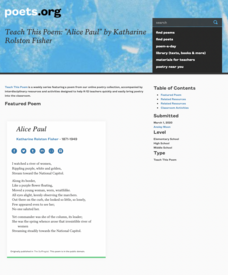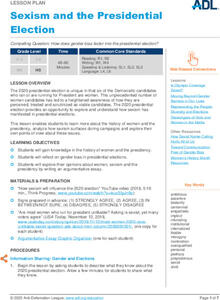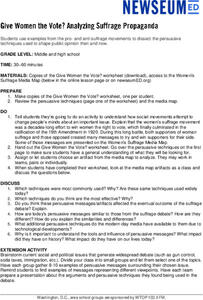National Endowment for the Humanities
The Realism in Magical Realism
A lesson on magical realism has young historians research how Garcia Marquez weaves historical events and his own experiences into One Hundred Years of Solitude. Using historical records and information found in a biography of Garcia...
Academy of American Poets
Teach This Poem: "When Fannie Lou Hamer Said" by Mahogany L. Browne
After watching an excerpt from a video of Fannie Lou Hamer's testimony before Congress, pupils do a close reading of Mahogany L. Browne's poem "When Fannie Lou Hamer Said," annotate words and phrases that draw their attention and list...
Academy of American Poets
Teach This Poem: "Alice Paul" by Katharine Rolston Fisher
Powerful women need not look like Wonder Woman. After writing a paragraph about a strong woman they know, young scholars examine images of Alice Paul and then do a close reading of Katharine Rolston Fisher's poem "Alice Paul." Finally,...
National Endowment for the Humanities
Themes in Lord of the Flies
William Golding's Lord of the Flies is the anchor text for a lesson plan that teaches readers how to distinguish between a literary topic and a literary theme. Using the provided worksheets, groups first chart some themes and propose a...
National Endowment for the Humanities
Characterization in Lord of the Flies
Readers of Lord of the Flies hunt down direct and indirect examples of how William Golding brings his characters to life. After instructors guide learners through the process of collecting evidence of these two types of characterization...
National Endowment for the Humanities
Symbolism in Lord of the Flies
Readers of Lord of the Flies examine the four main symbols William Golding develops in his novel: the island, the conch, the Lord of the Flies effigy, and fire. Partners select one of the major symbols and create an image by adding words...
National Endowment for the Humanities
Edgar Allan Poe, Ambrose Bierce, and the Unreliable Narrator
Stories by Edgar Allan Poe and Ambrose Bierce provide readers with an opportunity to investigate unreliable narrators. The lesson plan begins with an activity about different types of point of view and continues as scholars apply their...
Learning for Justice
Marian Wright Edelman
Marian Wright Edelman's 2014 Commencement Speech at Lewis and Clark College serves to inspire young scholars to investigate a problem in their community, to determine why the problem is important, and then to develop a plan for one thing...
Learning for Justice
Mary McLeod Bethune
Young historians conduct a close reading of the text of an interview with Mary McLeod Bethune, the daughter of former slaves who taught herself to read, grew up to establish schools for other Black women, and went on to become an advisor...
Anti-Defamation League
Sexism and the Presidential Election
Young historians investigate how sexism impacted the 2020 United States presidential election. They examine media coverage of the six women candidates, engage in a four-corners debate reacting to statements about gender and the...
Anti-Defamation League
Student Dress Codes: What's Fair?
The controversy over school dress codes continues. The debate involves questions like, why is there a policy? Who sets the policy? Who enforces the policy? What is a fair policy? Tweens and teens have an opportunity to engage in the...
Anti-Defamation League
Is Olympic Coverage Sexist?
Women Olympians have come a long way since 1900 when 22 women competed for the first time. News coverage of the Olympics has also changed dramatically. What has been slow to change, however, is the language used in the coverage of female...
Anti-Defamation League
Soccer, Salaries and Sexism
Call it soccer, call it football, but call it unfair! the US women's soccer team has called out the US Soccer Federation for unfair treatment in terms of salaries, support, and working conditions in a lawsuit filed in 2019. Young...
Learning for Justice
Mary Church Terrell
Excerpts from an 1898 speech by civil rights activist Mary Church Terrell offers young scholars an opportunity to investigate how Black American women fought for civil rights long before Rosa Parks and the civil rights movement of the...
Anti-Defamation League
The Gender Wage Gap
"Equal pay for equal work!" may sound logical but it is not the reality. High schoolers begin a study of the gender wage gap with an activity that asks them to position themselves along a line that indicates whether they strongly agree...
Anti-Defamation League
Who is Malala Yousafzai?
Malala Yousafzai may be young, but she's mighty! Young scholars listen to a short lecture about Malala's background, read an article about her winning the Novel Peace Prize, and meet in groups to discuss statements she has made. Class...
Anti-Defamation League
Shirley Chisholm: Unbought, Unbossed and Unforgotten
A 13-page packet introduces high schoolers to a lady of amazing firsts. Shirley Chisholm was the first Black woman elected to Congress, the first Black woman to run for President of the United States, and a leader of the Women's Rights...
Anti-Defamation League
Harriet Tubman on the $20 Bill: The Power of Symbols
How important are symbols and symbolic gestures in society? Middle schoolers have an opportunity to analyze the importance of symbols on American currency with a lesson plan that investigates the controversies surrounding redesigning the...
Anti-Defamation League
Women's Suffrage, Racism, and Intersectionality
The Nineteenth Amendment granted women the right to vote—as long as they were white. High schoolers read articles and essays about racism in the suffrage movement and consider how intersectionality played a role in the movement. Scholars...
Newseum
Civil War: Encoding the News
Young journalists learn to appreciate the advantages of how modern media technology enables rapid news delivery as they compare today's media revolution to how the telegraph and Morse Code revolutionized news coverage during the Civil...
Newseum
Bias Through History: Analyzing Historical Sources
Young journalists use the E.S.C.A.P.E. (evidence, source, context, audience, purpose, and execution) strategy to evaluate historical and contemporary examples of bias in the news. The class then uses the provided discussion questions to...
Newseum
The Press and the Presidency: Friend or Foe? How the President Is Portrayed
In theory, news reports should be fair and unbiased. Young journalists test this theory by selecting a current news story covered by various media outlets about the President of the United States. They then locate and analyze five...
Newseum
Give Women the Vote? Analyzing Suffrage Propaganda
Propaganda is often used to shape public opinion. Scholars investigate the persuasive techniques used by the pro- and anti-suffrage movements. Groups compare how these devices were used during the suffrage movement with how the same...
Newseum
Free Press Challenges Through History: Analyzing Historical Sources
The debate over the integrity of stories in media is not new. Young journalists analyze historical sources that reveal freedom of the press controversies and draw parallels to challenges freedom of the press faces today.

























